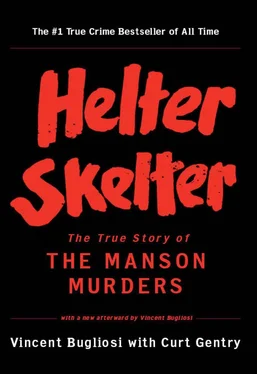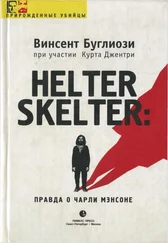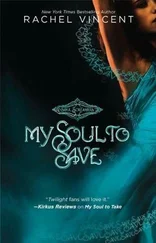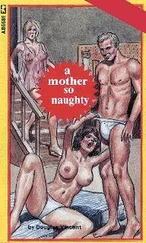Q.“How did you come to that conclusion?”
A.“She admitted it on the witness stand, Mr. Shinn, for one thing.
Also, she told Ronnie Howard and Virginia Graham that she stabbed Sharon Tate.”
Shinn was trying to reinstate the “deal” in which the DA’s Office agreed not to seek the death penalty against Susan if she testified truthfully. As Older told him at the bench: “Susan Atkins took the stand in this case under oath and testified that she was lying at the grand jury. If there’d been any agreement, that in itself would have been enough to negate it.”
Keith asked me if I had either heard the tape Leslie made with Part or discussed its contents with him. I replied that I had not. Kanarek’s cross-examination went so far afield that Judge Older finally terminated it.
Others who took the stand in succeeding days included Aaron Stovitz; Evelle Younger, former Los Angeles District Attorney and now California State Attorney General; attorneys Paul Caruso and Richard Caballero; and promoter Lawrence Schiller. Every aspect of the December 4, 1969, agreement; the taping of Atkins’ account; the selling of her story; her grand jury testimony; and her firing of Caballero the day after her meeting with Manson was discussed. Shinn’s most strenuous cross-examination of the entire trial took place when he had Schiller on the stand: Shinn wanted to know exactly how much Susan’s story had earned and in which bank accounts every penny was. Shinn was to receive Susan’s share for representing her.
During my cross-examination of these witnesses, I scored a number of significant points. I brought out through Caruso, for example, that during the December 4, 1969, meeting he had stated that Susan Atkins probably wouldn’t testify at the trial “because of her fear of Manson.”
Kanarek, however, scored one of the biggest points—for the prosecution. In questioning Caballero, Atkins’ former attorney, he asked: “What did [Susan Atkins] tell you about the language written in blood at these three homes?”
CABALLERO“I told you not to ask me that question, Irving.”
Apparently convinced that Caballero was hiding something favorable to his client, Kanarek repeated the question.
Caballero sighed and said: “She told me that Charles Manson had wanted to bring on Helter Skelter and it wasn’t happening fast enough, and the use of the word ‘pig’ was for the purpose of making them think that Negroes were committing these crimes, because the Panthers and people like that are the ones that used the name ‘pig’ to mean the establishment, and that was the whole purpose of it, that Helter Skelter wasn’t happening fast enough, and Charlie was going to bring on the ruination of the world, and this is why all the murders were committed.
“I asked you not to ask me these questions, Mr. Kanarek.”
Having failed abysmally in their attempt to sell the copycat motive, the defense now switched to a new tactic. They called a number of psychiatrists to the stand, hoping to establish that LSD had affected the minds of the three female defendants to the extent that they were not responsible for their acts.
It was not a real defense, but it could be made to seem a mitigating circumstance which, unless thoroughly rebutted, might tip the scales in favor of life imprisonment.
Their first witness, Dr. Andre Tweed, professed to be an expert on LSD, but almost all of his testimony was contrary to that of acknowledged experts in the field.
Tweed claimed he knew of one case where a youth while under LSD heard voices which told him to kill his mother and his grandmother, and he did just that. On the basis of this single, unidentified case, Tweed concluded that “people may perform homicidal acts while under the influence of LSD.” It was also his opinion, he said, that LSD probably caused brain damage.
On cross-examination I brought out that Dr. Tweed had only talked to Patricia Krenwinkel for two hours. He had not read the trial transcripts or interviewed any of her friends or relatives. He had never done any controlled research in the field of LSD, had only lectured once on the subject, and had written no papers on it. When I asked him why he considered himself an expert, he rather loftily replied: “What is an expert but what the beholder thinks he is from his experience? Many people consider me an expert, so I have accustomed myself to assuming that I am.”
Q.“Do you consider Dr. Thomas Ungerleider of UCLA an expert in LSD?”
A.“Yes, I do.”
Q.“More than yourself?”
A.“I am not in a position to judge that. I will leave that to others.”
Q.“Do you consider Dr. Duke Fisher of UCLA an expert in the field of LSD?”
A.“Yes.”
I then brought out that the two men had written a paper entitled “The Problems of LSD in Emotional Disorders,” in which they concluded that “there is no scientific demonstrable evidence of organic brain damage caused by LSD.”
Tweed now had to admit that was correct, as far as present evidence went.
On December 24, 1969, Patricia Krenwinkel had been examined by a Mobile, Alabama, psychiatrist, a Dr. Claude Brown. Since Tweed had based his conclusions in part on Brown’s report, I was given a copy of it just prior to my cross-examination.
It was a bombshell, as my next question to Dr. Tweed indicated:
Q.“In forming your opinions with respect to Patricia Krenwinkel, did you take into consideration that she told Dr. Brown that on the night of the Tate murders Charles Manson told her to go along with Tex Watson?”
After numerous objections and lengthy conferences at the bench, Dr. Tweed admitted that he had considered this. Still later, Patricia Krenwinkel was recalled to the stand, where, though she denied the truth of the statement, she admitted that she had told Dr. Brown that this was so.
We now had a perfect score. Manson had called Sadie, Katie, and Leslie to the stand in an attempt to exonerate him. Instead, I had now proven that each of the three had previously told others that Manson was behind these murders.
There were other surprises in the Brown report. Krenwinkel also told the doctor that she had fled to Mobile “because she was afraid of Manson finding her and killing her”; [82] Although harmful to Manson, this could only be helpful to Fitzgerald’s client, Patricia Krenwinkel. However, it was not Fitzgerald who brought this out but Keith, after Fitzgerald had concluded his examination.
that on the day of the Tate murders she was coming off an acid trip and wasn’t on any drugs that night; and that following the murders “she was always fearful that they would be arrested for what they had done, but ‘Charlie said nobody could touch us.’”
This latter statement proved that Katie was well aware of the consequences of her acts.
This was important, since it was obvious from their questions that the defense attorneys were trying to imply that the three female defendants were insane at the time they committed these murders.
Under California law an insanity plea must be entered before the start of the trial. A separate sanity phase is then held, after the guilt trial. The defense, however, had not entered such a plea at the proper time. Therefore, in one sense, the question of whether the defendants were sane or insane was irrelevant, since this was not an issue which the jury would have to decide. In another sense, however, it was crucial. If the defense could cause the jury to doubt the sanity of the defendants, this could strongly influence their vote on the penalty they were to pay.
Читать дальше












